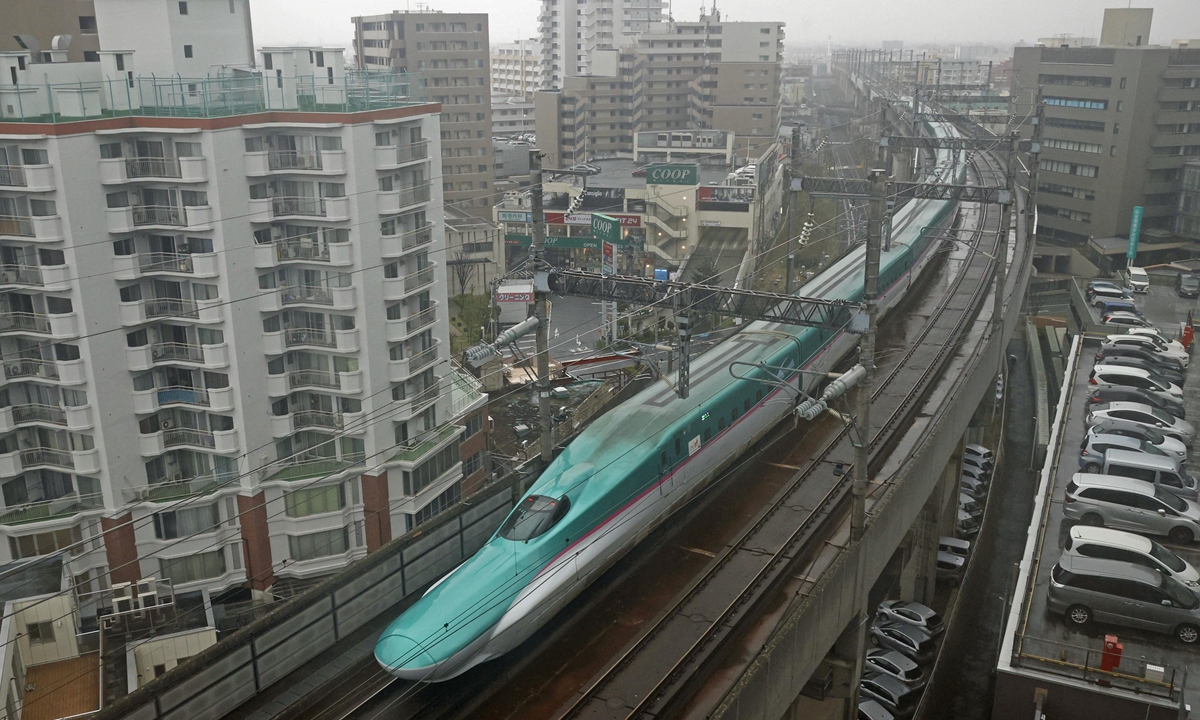
A bullet train heads for Tokyo. Photo: VCG
Due to the Japanese yen's sharp depreciation, Japan's nominal GDP denominated in US dollar terms is likely to shrink significantly to below $4 trillion this year, falling back to a level last seen 30 years ago, the Nikkei reported on Monday.
Over the past three decades, great changes have taken place across the global economic landscape. In dollar terms, the Chinese economy has grown 20-fold, the US has recorded a threefold increase, but the Japanese economy is falling back to where it was 30 years ago. The severe challenges and difficulties faced by the Japanese economy pose a serious question for Japan's political elites as to how long they will allow an economic and trade agenda rife with "Cold War" mentality continue to drag down the economy.
Specifically, the Japanese economy is facing such challenges as depreciation of the yen, record trade deficit and soaring energy costs. Although Japan's economy and financial markets are closely linked to the US, Japan's central bank failed to follow the US Federal Reserve's rate hikes, leading to the continuous depreciation in the yen against the dollar.
While the Bank of Japan's intention to stimulate the economy and avoid a prolonged period of deflation is understandable, the fact that the ultra-loose monetary and fiscal policies that have been implemented over the past eight years have failed to boost the economy is sufficient to indicate the vulnerability of the Japanese economy.
At such a difficult time, strengthened economic and trade ties with China would help if Japan wants to revive its economy. Yet, the Japanese government, under so-called economic security considerations, has appeared more enthusiastic than ever to align itself with the US in terms of regional geopolitical and economic issues, at the expense of its economic ties with China.
It is no secret that Prime Minister Fumio Kishida's government has been aggressively promoting the so-called economic security concept, with the Japanese parliament in May passing an economic security bill aimed at guarding technology and reinforcing critical supply chains.
Some in Japan believe that seizing every opportunity to strengthen cooperation with the US and other technologically advanced countries will deliver it more advantages in the face of the so-called "economic security threats" from China. However, a more likely outcome could be that Japan's misguided approach may end up hurting its own economy and that of the region.
For Japan, the chance to be one of the economic rule-makers with the US in the region may seem tempting, but Japan should not ignore the fact that anyone can be hurt by the hegemony of rules that prioritize American interests.
This year marks the 50th anniversary of the normalization of diplomatic relations between China and Japan. After half a century of ups and downs, fruitful results have been seen across bilateral economic and trade cooperation. China has been Japan's largest trading partner for 15 years in a row, with trade with China accounting for more than 20 percent of Japan's foreign trade. Bilateral trade in 2021 reached an all-time high of $371.4 billion.
Objectively speaking, with such a strong complementary trade structure between the two countries, it is necessary for Japan to maintain its basic policy rationality and strategic independence based on its own interests and those of the region. There should be rational boundaries to safeguarding potential economic risks, instead of politicizing economic cooperation to provoke confrontation.
If Japan blindly follows the US in "economic and technological decoupling" from China, it will not only seriously affect the stable development of China-Japan relations but also derail the Asia-Pacific economic integration to a large extent, which will also deprive Japan of further opportunities in benefiting from regional economic upgrade. The faltering Japanese economy cannot afford such dire consequences.



